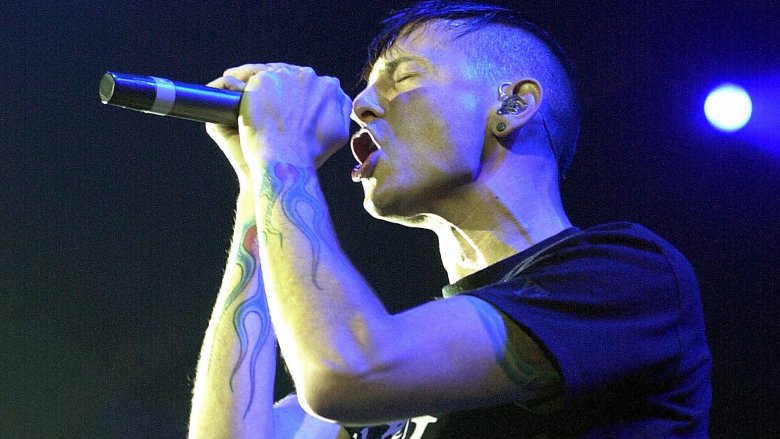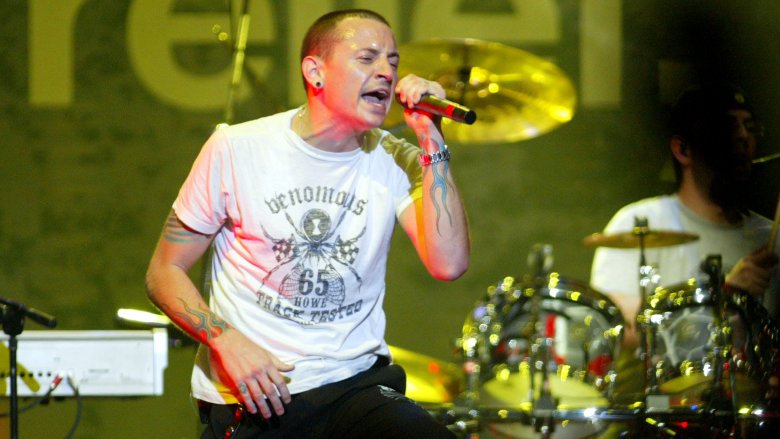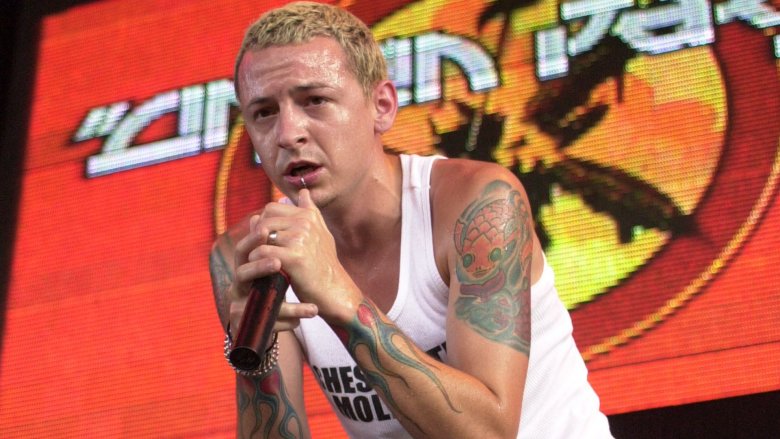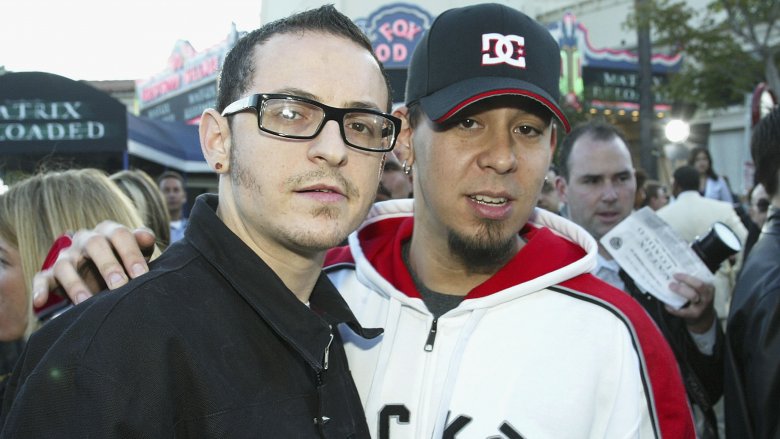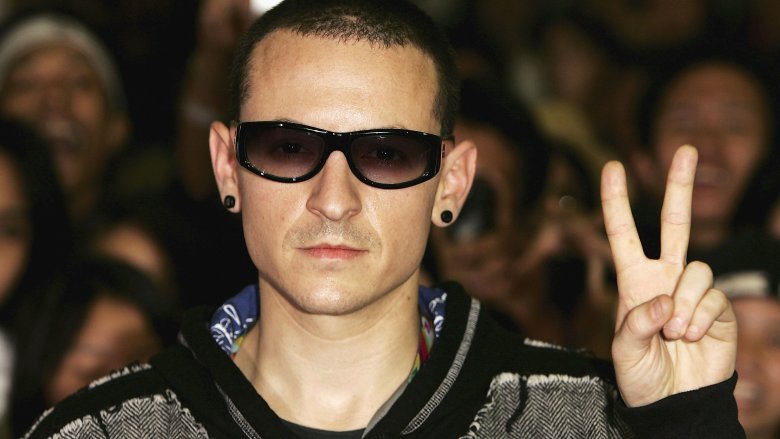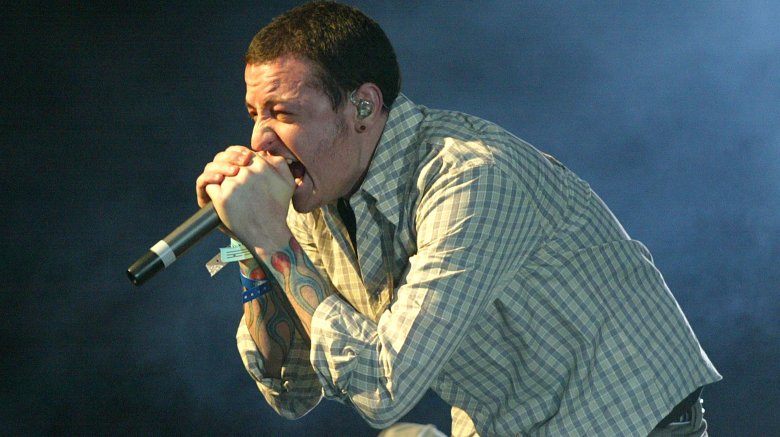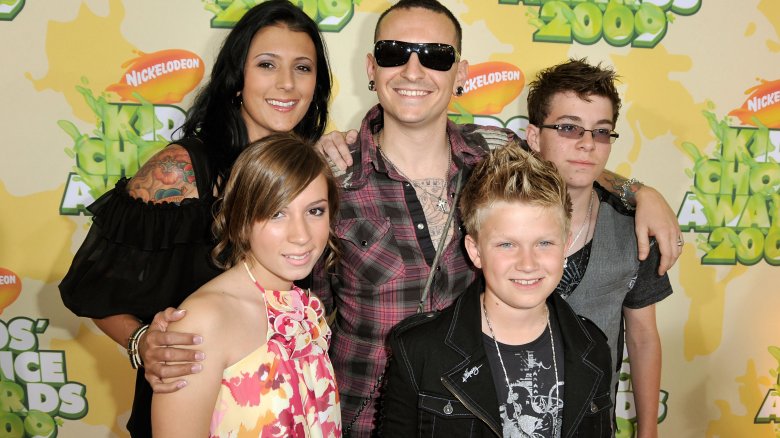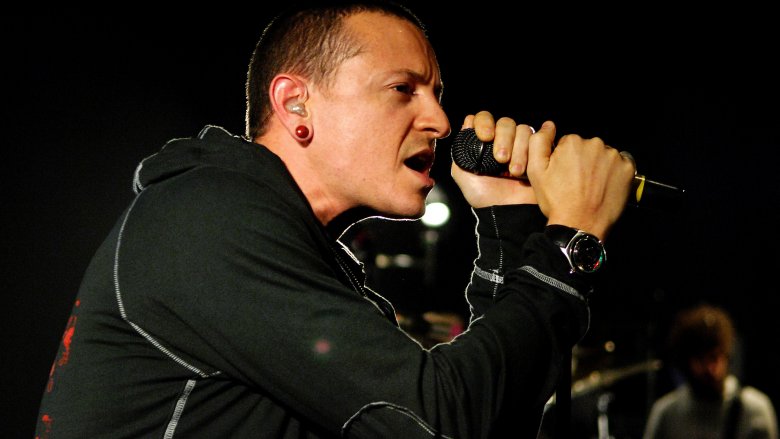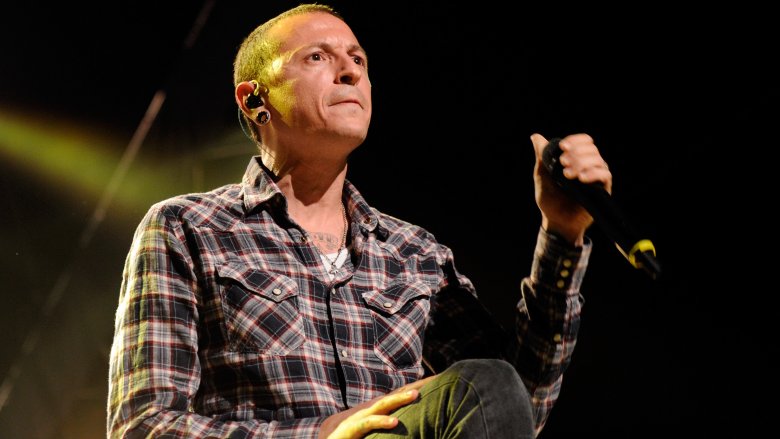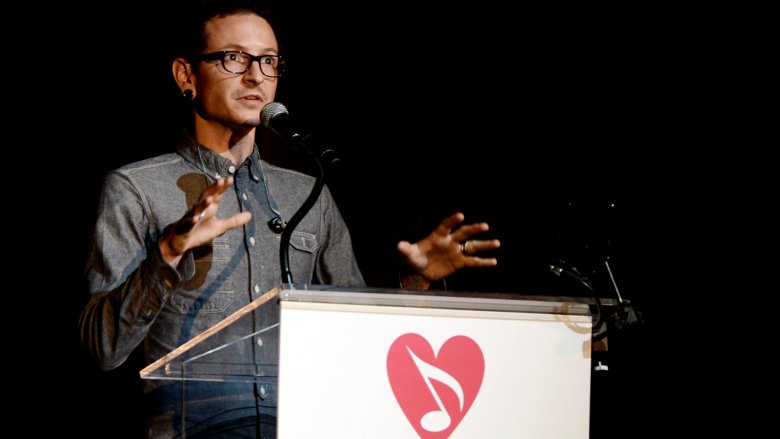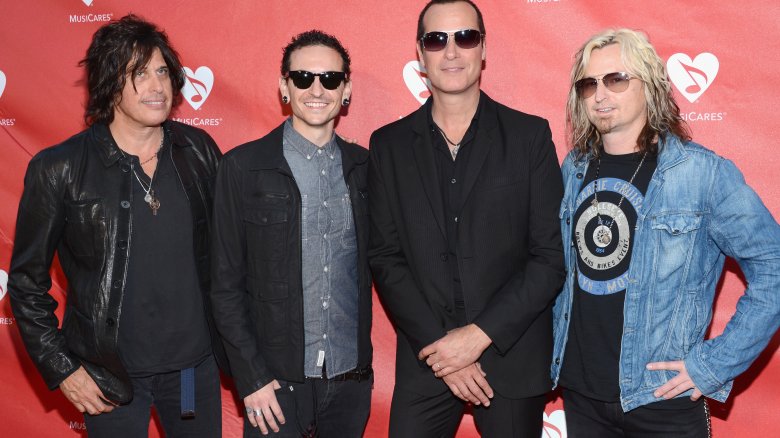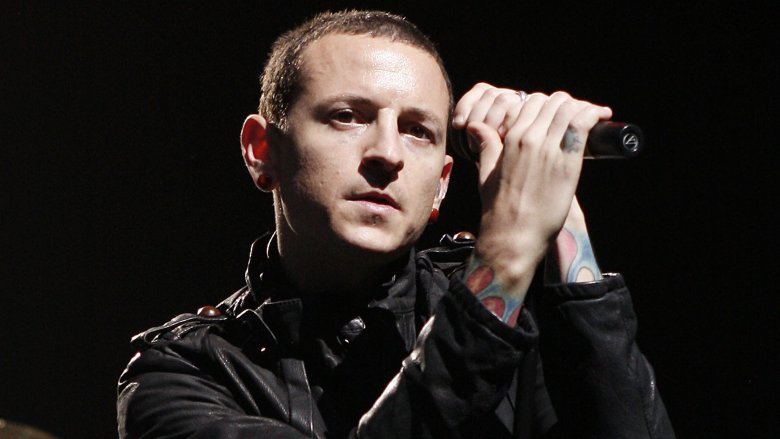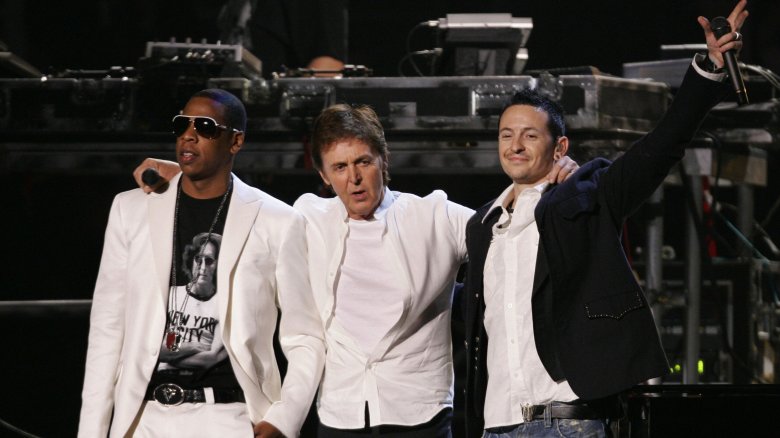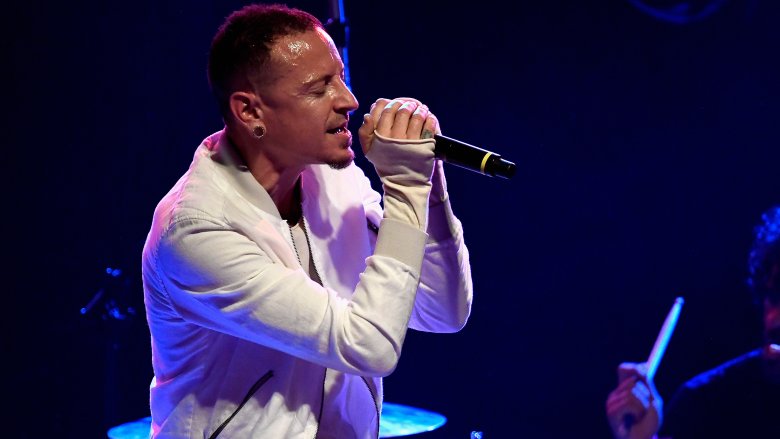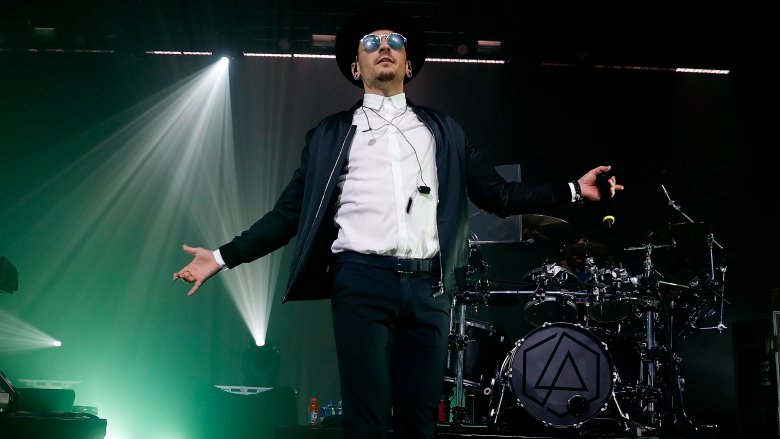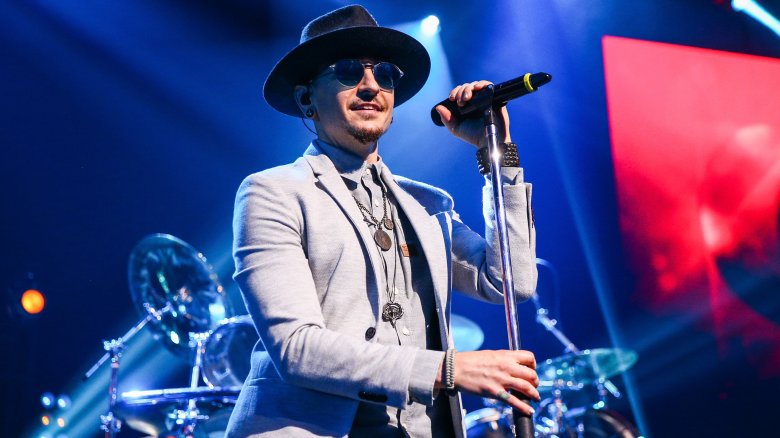The Untold Truth Of Chester Bennington
Chester Bennington rose to rock star fame in 2000 as Linkin Park's Grammy-winning debut album, Hybrid Theory, burst onto the scene, dominating the charts with hits such as "One Step Closer" and "Crawling." Though Bennington was candid about his personal connection to the angst in his music, the frontman's death by hanging in July 2017, at age 41, suggests that his demons ran deeper than fans realized. Let's take a closer look at the untold truths that tormented this highly-respected musician.
He was abused as a child
In a 2008 interview with Kerrang!, Bennington revealed that he was molested by an older friend at the age of seven. "I was getting beaten up and being forced to do things I didn't want to do. It destroyed my self-confidence," he told the magazine. "Like most people, I was too afraid to say anything. I didn't want people to think I was gay or that I was lying. It was a horrible experience."
It was a defining moment in Bennington's life that he only revealed after critics cast doubt on the authenticity of the pain in his lyrics, according to The Guardian. Despite succumbing to substance abuse to cope with the childhood trauma, Bennington chose not to pursue retribution against his abuser. After discovering that his abuser had himself been a victim of abuse, Bennington said, "I didn't need revenge."
He struggled with drug addiction at a young age
Bennigton's parents divorced when he was 11. "It was an awful time," he told Kerrang! "I hated everybody in my family: I felt abandoned by my mom, my dad was not very emotionally stable then, and there was no-one I could turn to—at least that's how my young mind felt. The only thing I wanted to do was kill everybody and run away."
Bennington eventually found some solace through drawing and poetry, but the biggest boost to his confidence came when he started his first band, Grey Daze. That creative outlet proved dangerous. "The problem was, I also found a good way to escape the abuse of my past," he told the rock magazine. "Getting high, drinking a lot and having sex with a lot of great girls is a pretty good escape."
Bennington's drug use rapidly escalated to the point where he was abusing meth, opium, and LSD before he'd even hit age 17. In a 2011 interview with The Guardian, he said, "I remember that stuff happening to me at that stage and even thinking about it now makes me want to cry. Oh my God, that was f**king happening to me and I was just that little, much earlier than I'd remembered. My God, no wonder I became a drug addict."
He lived in his car
Before Linkin Park found success, the band—known then as Xero—was rejected by every major label. Warner Bros. passed the group over three times before finally signing it in 1999. At the time, Bennington was essentially homeless and living out of his car. "It wouldn't go over thirty-five miles an hour," he told Rolling Stone. "Two lights were burned out. I had no money to replace them."
Despite being a late addition to the tight-knit band, Bennington's dedication motivated the group. "We each made our own sacrifices, but Chester's was unique," guitarist Brad Delson told the magazine. "Because he had so much to risk, he was extremely motivated. He would actually tell us, 'Guys, I don't think we're working hard enough.'"
The band's efforts eventually paid off. Linkin Park's debut, Hybrid Park, became the best-selling album of 2001, but making that record was no easy task, and Bennington's loyalty was tested from the jump.
Warner Bros. wanted him to fire Mike Shinoda
As Linkin Park hustled to record Hybrid Theory, Bennington and co-founder Mike Shinoda worked closely together on the lyrics, which pulled heavily from Bennington's abusive childhood, but Warner Bros. reportedly began requesting some changes that didn't sit well with Bennington. Namely, making Bennington the "star" and relegating Shinoda to either a keyboard player or just firing him.
"I said, 'F**k you guys. Are you serious? I've only just got into the band, and you're telling me to start a coup against the guy who writes all the music? It's his band. If he could sing, I wouldn't have a job. You f**king idiots, what's wrong with you?'" Bennington told Kerrang! "After that, they told Mike to try and rap like Fred Durst. It was like, are we on the same f**king planet here?"
At that point, the band reportedly cut off all communication with Warner Bros. and told the label to the group if it didn't like how the band was doing things. Ultimately, Hybrid Theory became a roaring success, but with fame, came new challenges.
He struggled with Linkin Park's early success
Despite opening up to bandmate Shinoda during the songwriting process, Bennington still felt isolated from the rest of Linkin Park and soon spiraled into addiction. He attributed some of his problems to his first marriage.
"Unfortunately, my ex-wife [Samantha, whom he married when they were so poor he couldn't afford a wedding ring] and I were really toxic for each other, too young to get married," he told The Guardian. "We were volatile personalities, and even though we helped each other, we were not good for each other, and that brought up other feelings."
Touring, with its easy access to drugs, only made things worse. Beddington's bandmates finally staged an intervention. "I had no idea that I had been such a nightmare," he told Team Rock. "I knew that I had a drinking problem, a drug problem and that parts of my personal life were crazy but I didn't realize how much that was affecting the people around me until I got a good dose of 'Here's-what-you're-really-like.' It was a shock. They said that I was two people — Chester and then that f**king guy. I didn't want to be that guy." Bennington got his act together and got a divorce, and Linkin Park grew closer.
Singing used to make him throw up at shows
While touring around the release of Linkin Park's second album, Meteora, in 2003, Bennington suffered from hiatal hernia, a condition that "occurs when part of the stomach slides above the diaphragm, allowing stomach acid to flow freely into the esophagus," according to MTV News. While that sounds awful enough on its own, hiatal hernia can be an even bigger nightmare for a singer like Bennington.
"I'm kind of queasy all the time," he told MTV. "I'm basically gonna be sick to my stomach until I have the surgery done. Every night when I sing, it kind of pisses off the hernia. Last night I was vomiting when I was singing."
The singer's digestive problems got so bad that he had to cancel shows because the stomach acid burned his throat so badly that he got an infection. Fortunately, Bennington overcame his medical issues and continued to be a prolific frontman for years to come.
He had an insane cyberstalker
In 2006, a cyberstalker took control of almost every online account belonging to Bennington and his second wife, Talinda. The female stalker reportedly called the couple at random hours of the night and made terrifying remarks like "I know where your kids are," and "I have complete control of your lives."
In a gripping investigation reported by Wired, the situation turned critical when a former Secret Service agent traced the stalker's activity to a computer at Sandia National Laboratories, a nuclear weapons facility in Albuquerque, N.M. The agent reportedly learned that the stalker was a computer technologist at the facility and also an obsessive Linkin Park fan. When confronted at work, Devan Townsend told the investigator that she had terrorized the Benningtons because "she was bored. Her job at Sandia took about half an hour a day, and she was looking to pass the time."
After Townsend's arrest, Bennington remained on edge. "When you find out some total stranger has personal pictures of your kids in the bath, has phone numbers of your parents and close friends and every business associate, listens to every voicemail you've had for the last year, intercepts every email you've written or received...it fuels my desire to make sure this kind of action is viewed as criminal," he told Wired. As a precaution, Bennington and his wife began using lengthy passwords for all their online activity, "and it drives me out of my f**king mind," he said. "I want to go back."
He started another band after Linkin Park's third album
In 2008, in the wake of Linkin Park's Minutes To Midnight, Bennington formed a new band called Dead by Sunrise. "I came up with a few songs that felt and sounded really good, but I knew they weren't right stylistically for Linkin Park," he said in a press release. "They were darker and moodier than anything I'd come up with for the band. So I decided to work on them on my own rather than turn them over and have them transformed into Linkin Park tracks."
Dead by Sunrise only released one album in 2009, Out of Ashes, which Bennington described to MTV News as "post-apocalyptic Blade Runner meets LSD." Despite his hope of having a new album every five years, a follow-up never materialized. However, that didn't stop Bennington from making one thing clear about his involvement with Dead by Sunrise: Don't call it a side project. "We're a full, ready-to-go band and so this is something we take very seriously," he told Rolling Stone.
He spoke out against gun violence
Following the horrific shooting in Tucson, Ariz. that left six dead and Senator Gabby Giffords in critical condition in 2011, Bennington broke from a promotion event to field an interview question about the tragic event.
"I personally feel that violence and war and murder are primitive, and I think that we've evolved as a species beyond that. Unfortunately, some people still feel that's a means to an end," he told the Broward Palm Beach New Times. "Peace and love and communication are the way that we all resolve our issues with each other. There's a non-violent way to express yourself and get your point across—regardless of what you're saying or what your point is."
"In a free society, people have a right to believe whatever they want to believe. That's their business and they can speak their mind," Bennington said. "But nobody, even in a free society, has the right to take another person's life. Ever. That's something that we really need to move beyond."
He received the Stevie Ray Vaughan Award for his charity work
While Linkin Park is mostly known for its hard rocking songs carried by Bennington and Shinoda's vocals, the band is big on supporting charitable causes. In 2013, Bennington received the Stevie Ray Vaughan Award for his work helping recovering addicts through the MusiCares MAP Fund.
"MusiCares MAP Fund is an amazing program that takes care of their own, and actually saves lives." he told Loudwire, "It's been so rewarding to support them and see firsthand what they've accomplished for so many artists."
Given Bennington's troubled past with addiction, it was impressive to see the Linkin Park singer dedicate himself to helping others combat substance abuse.
He fronted Stone Temple Pilots
In some of Linkin Park's earliest interviews, Bennington spoke about being a huge Stone Temple Pilots fan. He even told Rolling Stone that he made a bet with a Warner Bros. promotion manager that if Hybrid Theory went gold, she'd have to give Bennington her triple-platinum STP plaque. (Bennington won.)
So imagine Bennington's surprise when he was asked to front STP in 2013 after Scott Weiland left the group. The collaboration lasted two years, and in November 2015, Bennington amicably left the group to spend more time with his family and to focus on Linkin Park.
However, like too many aspects of Bennington's life, even his time with STP took a tragic turn. Weiland died on Dec. 3, 2015, from an accidental overdose of cocaine, ethanol, and MDA. While it couldn't have been easy for Bennington to experience the death of one of his idols, he'd be hit even harder by the death of another rock legend and close friend just two years later.
He wasn't afraid to talk about depression
In February 2017, Bennington opened up about his battles with depression during a radio interview with 102.7 KIIS-FM. The singer didn't hold back.
"I know that for me, when I'm inside myself, when I'm in my own head, it gets... This place right here [points to his head], this skull between my ears, that is a bad neighborhood, and I should not be in there alone." he told host JoJo Wright (via Loudwire). "I can't be in there by myself. It's insane! It's crazy in here. This is a bad place for me to be by myself. And so when I'm in that, my whole life gets thrown off. If I'm in there, I don't say nice things to myself. There's another Chester in there that wants to take me down."
Bennington also shared coping mechanisms that worked for him. "...whether it's substances or whether it's behavior or whether it's depressive stuff, or whatever it is, if I'm not actively doing...getting out of myself and being with other people, like being a dad, being a husband, being a bandmate, being a friend, helping someone out...If I'm out of myself, I'm great. If I'm inside all the time, I'm horrible — I'm a mess."
While Bennington fell victim to suicide, there's no doubt he was dedicated to removing the stigma associated with mental illness and helping others see potential warning signs before it's too late.
He was open to collaborating with anybody
Thanks to working with superstar producer Rick Rubin, Linkin Park moved past their early nu metal, rap-rock sound, and Bennington, in particular, seemed motivated to not be tied down by a genre.
"It doesn't matter what style we write in, as long as it comes from a pure place and it's something that we pour our hearts and souls into, we can deal with what happens from that point forward," he told Rock Sound, while promoting the band's 2017 album One More Light. "I think for us, creativity is way too big to be put in a box, and for us we're not a one trick pony. We like to really play with our palette and expand our abilities as songwriters and performers."
Bandmate Shinoda probed the limits of what Bennington would try, but Bennington showed no bounds. "Mike was giving me litmus tests like, 'Hey, what would you say if I said...let's do a collaboration with Katy Perry or Kelly Clarkson?' and I was like, 'F**k yeah! I actually really like pop music.' It was just a test to see if I'd go, 'Absolutely not, that makes me want to puke' or if I'd be open to the idea, and I'm pretty much open to anything."
However, One More Light didn't go over well with fans and critics, and Bennington found himself unable to control his emotions as the album was panned.
He didn't have the best reaction to One More Light critics
Just days before Cornell's suicide, and just two months before his own, Bennington sat down for an interview with Kerrang! and passionately discussed the band's musical direction with One More Light. It didn't take long before the singer started lashing out at fans who didn't appreciate their new tracks, such as "Heavy."
"We know they're going down a route that a lot of our hardcore rock fans are going to be like put off by it maybe," he said. "I think my response was 'cool, f**k them we don't want them as fans anyways.' By now, if people don't know that we can throw a curveball then f**k them!"
The conversation continued to heat up. "If you're gonna be the person who says like 'they made a marketing decision to make this kind of record to make money' you can f**king meet me outside and I will punch you in your f**ing mouth because that is the wrong f**king answer," Bennington said. "Because guess what, calling us a sell out for that purpose is... selling out on your f**king excuse as to why you don't like it. You're a f**king p***y."
Yikes.
He was deeply affected by Chris Cornell's suicide
On May 18, 2017, former Soundgarden and Audioslave singer Chris Cornell hanged himself in a hotel room in Detroit. Like Bennington, Cornell had suffered from years of depression and drug addiction, and the two forged a tight bond after touring together in the late 2000s.
On the day of Cornell's death, Bennington shared a note on Twitter to his late friend. "I'm still weeping, with sadness, as well as gratitude for having shared some very special moments with you and your beautiful family," Bennington said. "You have inspired me in many ways you could never have known. Your talent was pure and unrivaled. Your voice was joy and pain, anger and forgiveness, love and heartache all wrapped up into one. I suppose that's what we all are. You helped me understand that."
At the time, no one could have known how ominous Bennington's parting words would be: "I'd like to think you were saying goodbye in your own way," he said. "I can't imagine a world without you in it. I pray you find peace in the next life."
Bennington and Linkin Park guitarist Brad Delson performed Leonard Cohen's "Hallelujah" at Cornell's funeral
He was found dead on Cornell's birthday
Bennington was found dead in his Los Angeles home on the morning of July 20, 2017, which would have been Cornell's 53rd birthday. Like Cornell, he reportedly hanged himself while his wife and six children were away. Shinoda confirmed the news on Twitter.: "Shocked and heartbroken, but it's true. An official statement will come out as soon as we have one."
He had a photo shoot planned the day of his suicide
According to TMZ, Bennington's body was found in his bedroom by a housekeeper. One of his bandmates reportedly arrived at the house shortly after the police. He was planning to pick up Bennington for a photo shoot later that day. Linkin Park was scheduled to go on tour the following week with Blink-182.
Questions remain about whether Bennington's suicide was planned or a spur of the moment decision. According to TMZ, there was no note.
Gone but not forgotten
Though Bennington left the world too soon, his legacy will live on. Reactions from fans and fellow musicians poured in following the news of his death.
"Gracious, kind & humble. A rare combination in Rock & Roll," wrote Metallica drummer Lars Ulrich.
"Literally the most impressive talent I've ever seen live! Vocal beast!" Rihanna posted to Instagram.
Avengers director Joss Whedon said Bennington's lyrics had carried him through some rough moments. "'A Thousand Suns' got me through a horribly dark time. I'm indebted. Thank you and RIP Chester Bennington, wish you were here."

